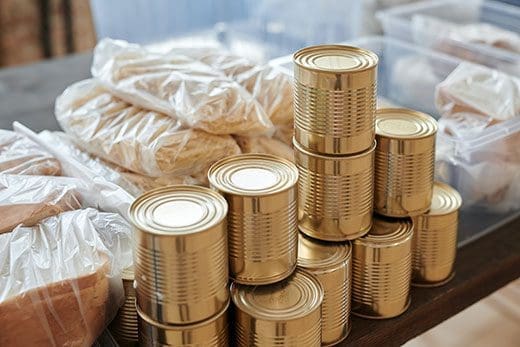Manhattan, Kan. — Donating food to food pantries and food banks is a way for neighbors to help neighbors, reduce food waste and help families that could use additional food, says Londa Nwadike, a food safety specialist who holds dual extension appointments with Kansas State University and the University of Missouri.
While donations are greatly appreciated at food pantries, Nwadike suggests NOT donating the following foods:
- Food past its labeled ‘Best by’ date.
- Spoiled, moldy foods.
- Home canned or home-prepared foods.
- Opened or re-packaged foods.
- Damaged packages, dented cans.
“Always check with the food pantry or food bank before donating fresh fruits and vegetables and any food that requires refrigeration of frozen foods to check if they are able to safely handle those foods,” Nwadike said.
Being mindful of what you donate to food pantries is key. “We want to be sure to donate safe and healthful food to help the food pantries also avoid food waste and extra labor and ultimately to help those using the food pantries to stay healthy,” she said.
Donating safe food to pantries is very important. “Many of the people who consume food from food pantries are from groups that are more vulnerable to foodborne illness, (including) the young, old, pregnant and sick,” Nwadike said. “Many times, people don’t want to throw food away, so they donate it, but it is always important to ensure that when we are donating food, that we also think about it from a safety perspective.”
Nwadike outlines some suggested non-perishable items in an Extension Food Safety publications as:
- Fruits that are canned in light syrup, juice or dried, such as peaches, applesauce, pineapple and others.
- Vegetables that are low in sodium and canned, such as corn, peas, carrots and others.
- Healthful grains, such as whole-grain crackers, brown rice, granola bars and others.
- Protein foods, such as canned tuna or salmon (water packed), canned chicken, nut butters and others.
- Dairy, such as evaporated milk, shelf-stable milk and nonfat dry milk.
Besides donating food, there are other ways to help food pantries, according to Nwadike. “Food pantries also appreciate monetary donations so they can purchase what they need the most in bulk, and they also appreciate volunteer time,” she said.
More information on how to safely donate food and reduce food waste is available on the website, K-State Research and Extension Food Waste.
At a glance
K-State food safety specialist Londa Nwadike says non-perishable items make the best choices to donate to food pantries.
Website
K-State Research and Extension food safety
Notable quote
“We want to be sure to donate safe and healthful food to help the food pantries also avoid food waste and extra labor and ultimately to help those using the food pantries to stay healthy.”
— Londa Nwadike, food safety specialist who holds dual extension appointments with Kansas State University and the University of Missouri
Source
Londa Nwadike
913-307-7391
lnwadike@k-state.edu
Written by
Jessica Jensen
jajensen@ksu.edu
For more information:
Donating Safe and Nutritious Food to Food Pantries and Soup Kitchens

K‑State Research and Extension is a short name for the Kansas State University Agricultural Experiment Station and Cooperative Extension Service, a program designed to generate and distribute useful knowledge for the well‑being of Kansans. Supported by county, state, federal and private funds, the program has county extension offices, experiment fields, area extension offices and regional research centers statewide. Its headquarters is on the K‑State campus in Manhattan. For more information, visit www.ksre.ksu.edu. K-State Research and Extension is an equal opportunity provider and em













